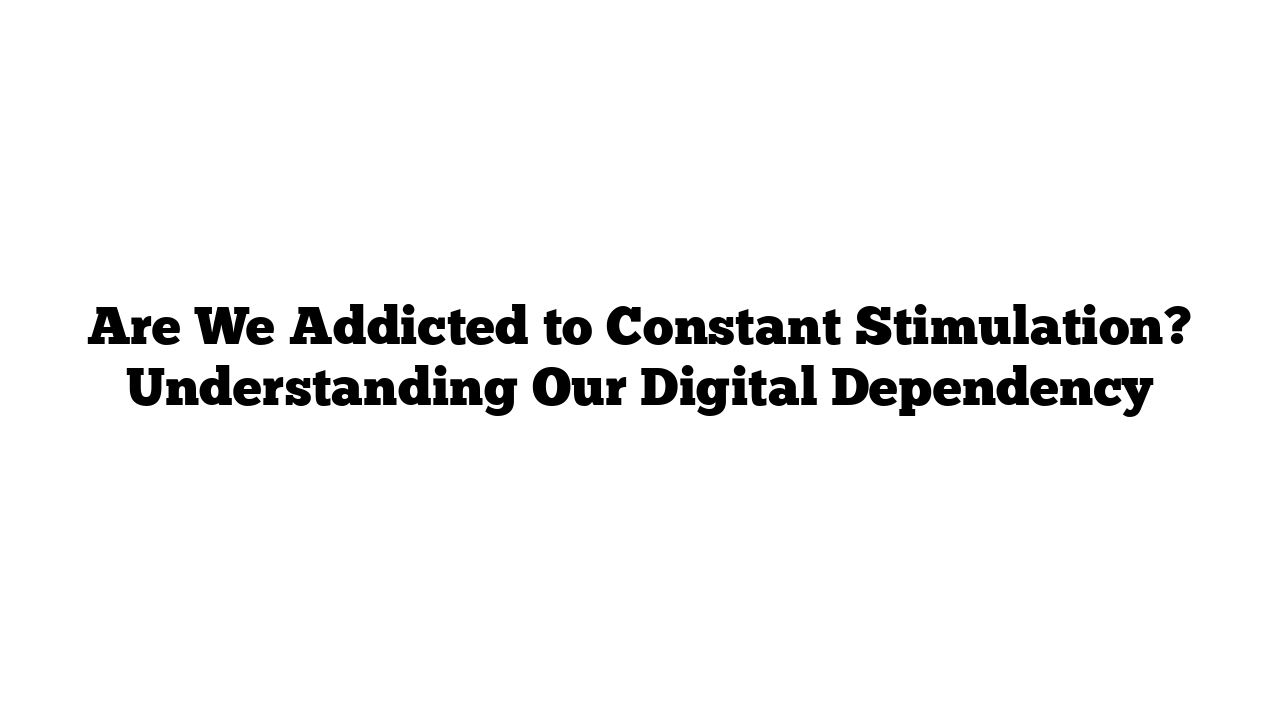In today’s fast-paced world, constant stimulation has become the norm. We find ourselves scrolling through Twitter while watching TV, listening to podcasts while working on our computers, and even watching split-screen TikToks to double the fun. It’s a digital circus that can feel overwhelming, and many of us are just as guilty of it as anyone else. But why do we feel the need for this nonstop stimulation?
The Need for Constant Stimulation
Ever noticed how difficult it is to sit in silence? You’re not alone. Many people feel an uneasy anxiety when faced with moments of quiet. But what’s driving this incessant need for distraction?
The Dopamine Myth
At first glance, it seems straightforward. We chase quick hits of dopamine, the chemical in our brain associated with pleasure. Every funny video or intriguing post gives us a little rush, making us come back for more. However, the dopamine fix is not as simple as it seems. Recent findings suggest that the dopamine response is more complex and tied to anticipation rather than pleasure itself.
When you attempt something, like hunting for food, dopamine helps motivate you to keep trying, even if you miss. Surprisingly, near misses can actually produce more dopamine than hitting the target. For instance, if pressing a button gives you a $5 reward, the anticipation of that reward releases dopamine. But if the button suddenly starts rewarding you with $100, your dopamine levels spike even higher—until it becomes the new norm, and you’re back to craving more.
How Our Brains Adapt
Imagine going for a walk outside, which used to be a refreshing escape. At first, it was satisfying. But then, we started listening to podcasts during our strolls, and that was even better! Eventually, we found ourselves scrolling through TikTok while listening to a podcast on our walks. Now, the simple act of walking can feel incredibly boring without all the extra stimulation.
Unfortunately, our brains are wired to seek satisfaction, and as we consume more digital content, we actually desire more. The result? A never-ending cycle of seeking new forms of stimulation because our previous rewards—like a simple walk or cooking breakfast—no longer feel fulfilling.
Attention Span in a Digital Age
Research indicates that our attention spans are getting shorter, largely due to the overwhelming influx of information available. In a world brimming with endless content, we feel compelled to absorb everything. This fear of missing out (FOMO) pushes us to stay updated on all news and events. The irony? While we’re trying to keep up with the latest trends, our personal interests often take a backseat.
Instead of nurturing our passions, we crowd our minds with every little detail, dividing our mental space into smaller and smaller pieces. The outcome is a constant state of hunger for more, leaving us perpetually craving stimulation.
The Technology Trap
You might think technology would lighten our load, but it has often replaced one kind of burden with another. Sure, we’ve offloaded some physical tasks to machines, but now we face spiritual exhaustion from constant connectivity and information overload. The promise of a more informed society hasn’t been entirely fulfilled, as we still grapple with unprecedented levels of misinformation.
Finding Your Balance
So, how can we break free from this cycle of dependence? While there’s no one-size-fits-all solution, the first step is acknowledging that every individual is unique. Some may find meditation helpful, while others might discover the benefits of taking a break from their screens. It’s about experimenting with what works for you.
Quote: “Fleeting moments of pleasure aren’t real happiness.”
Take the time to redefine what genuinely makes you happy. Seek out activities that bring you joy beyond digital stimulation, whether it’s a hobby, exercise, or simply enjoying a quiet moment.
The journey to balance will require patience and perseverance. Remember, every day is a new opportunity to try again, even if you stumble along the way.
For more insights on how to navigate our increasingly digital lives, visit medicaltimes.io.
References
By understanding the roots of our digital dependency, we can start to reclaim our attention and find satisfaction in the real world. Let’s embrace the journey towards a more balanced life!
